Handling the Everyday Heater Urgent Problems
Handling the Everyday Heater Urgent Problems
Blog Article
Just how do you feel in regards to Common Hot Water Heater Problems?

A water heater is among one of the most essential basic home appliances that can be found in a house. With water heaters, you do not need to undergo the anxiety of home heating water by hand each time there is a demand to wash, do the laundry, or the meals. There is constantly an opportunity that your water heater would act up as with a lot of mechanical tools.
It is essential to note any type of little breakdown and tackle it swiftly before things get out of hand. A lot of times, your hot water heater begins to malfunction when there is an accumulation of debris as a result of continual use. As a preventative measure, regular flushing of your hot water heater is advised to prevent debris build-up and also avoid functional failing.
Usual hot water heater emergency situations and exactly how to manage them
Inadequate warm water
It may be that the water heater can not support the hot water need for your home. You could upgrade your water heating system to one with a bigger ability.
Fluctuating water temperature level.
Your water heater can start creating water of various temperature levels usually ice scalding or cold warm. There may be a need to replace either the thermostat or the heating unit of your water heating unit.
Leaky water heater tank.
A leaking container could be a sign of corrosion. It might trigger damage to the flooring, wall as well as electrical devices around it. You can also go to danger of having your home flooded. In this circumstance, you should turn off your water heater, enable it to cool off, and carefully look for the source of the trouble. Sometimes, all you require to do is to tighten up a few screws or pipeline links in cases of small leaks. However if this does not function and also the leakage lingers, you may require to employ the services of a specialist for an ideal substitute.
Stained or stinky water
When this occurs, you require to understand if the problem is from the water or the storage tank resource. If there is no amusing odor when you run cool water, after that you are certain that it is your water heating system that is malfunctioning. The stinky water can be created by corrosion or the build-up of bacteria or debris in the water heating system container.
Conclusion
Some homeowners ignore little caution as well as minor faults in their hot water heater unit. This only results in further damages and a possible complete break down of your home appliance. You need to manage your water heater mistakes as soon as they come up to prevent even more costs and also unnecessary emergency troubles.
With water heating systems, you do not require to go via the stress and anxiety of heating water manually every time there is a need to take a bath, do the washing, or the recipes. It might be that the water heater can not support the warm water need for your apartment or condo. Your water heater could start generating water of different temperature levels generally ice cold or scalding hot. If there is no funny scent when you run cold water, then you are particular that it is your water heating system that is damaged. The smelly water can be triggered by corrosion or the accumulation of bacteria or sediments in the water heater tank.
Common Water Heater Issues and What You Should Do
What Type of Water Heater Do You Have?
Before we begin it’s first important that you identify the type of water heater you have on your property. There are two main types of water heaters out there: conventional and high efficiency.
Both of these types of products typically use either gas or electricity to heat power. There are also solar water heaters that use a thermal collector on the roof or yard to heat the water.
While these models are not as common, they can cut heating costs in half. In this article, we will focus on conventional and high efficiency.
How Do My Electric and Gas Water Heater Work?
Though they look similar, electric and gas water heaters work very differently. It’s important to know their basic function because often problems can be specific to the heating source.
In the electric model, a thermostat on the side of the machine detects the temperature of the water in the tank. When the temperature needs to rise electricity flows to a heating element suspended in the water.
Gas models also use a thermostat device — typically with a mercury sensor at the tip and an additional sensor called a thermocouple. The thermocouple detects whether the pilot light is on and controls the flow of gas.
When the thermostat drops below the appropriate level gas is released which becomes ignited by the pilot light. The flame heats the bottom of the water tank which causes hot water to rise and cold water to drop.
This natural circulation continues until the water reaches the desired temperature. Then, the thermostat triggers the gas control valve to shut off the flow of gas.
What Are the Most Common Issues and How Do You Fix Them?
https://happyhiller.com/blog/common-water-heater-issues-and-what-you-should-do/

As a reader about Is Your Water Heater Leaking?, I was thinking sharing that article post was beneficial. Make sure you take the time to promote this post if you liked it. Bless you for your time. Please visit our website back soon.
Save your home, call now! Report this page